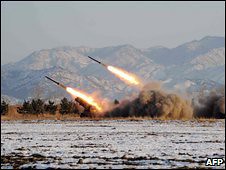
Missile launch in the Democratic People's Republic of Korea (DPRK) on April 5, 2009. The People's Republic of China urged calm while the US administration sought to promote alarm and condemnation. The DPRK conducted an underground nuclear test on May 25.
Originally uploaded by Pan-African News Wire File Photos
By Jamie Chisholm, Global Markets Commentator
May 25 2010 14:43
The double whammy of geopolitical and financial crises has knocked the fight out of investors, sending Asian stocks to a 10-month low and pushing the Dow Jones Industrial Average below 10,000 at the open.
The FTSE All-World index is tumbling 3.2 per cent, commodity prices and the euro are dropping, while the “havens” of dollar and Treasuries are in demand as traders scurry en masse away from risk.
The FTSE Global Banks index is down 2.5 per cent on regulation and solvency concerns. The stresses within the sector are being highlighted by the slow creep higher in the London interbank offered rate, which tracks the rate at which banks are prepared to lend to each other. Dollar three-month Libor is up for the 11th consecutive day, rising from 0.51 per cent on Monday to 0.536 per cent, a 10-month high.
Continuing concerns about the impact on global growth of the eurozone debt crisis have now been joined by fears that the Korean peninsula may be sliding towards conflict. Reports overnight suggested that Kim Jong-il, the North Korean leader, had ordered his military to prepare for combat after Pyongyang was accused by Seoul of torpedoing a South Korean navy vessel.
The South Korean won and stock market have taken a severe pummelling, with the ratcheting up of tensions coming at a time when global markets were already skittish, as signs of stress are once again emerging in the European banking sector.
Meanwhile, Wall Street institutions are also feeling unloved as lawmakers in Washington engage on delivering new rules for the financial system. Such regulatory shifts are another factor weighing on sentiment. Indeed, a decline in banking stocks was one of the reasons that the S&P 500 suffered a dramatic 1.3 per cent fall in the last few minutes of trading on Monday, all but cancelling out the equally late and vigorous bounce seen in the previous session.
Action of this kind exemplifies the extreme nervousness that abounds. Bulls will be hoping that signs of improving economic fundamentals can provide support. The US housing market remains crucial in that regard.
But unfortunately the Case-Shiller index of US house prices, released earlier today, was a tad disappointing, and this has added to the selling on Wall Street. The S&P 500 is off 3 per cent and the Dow has lost 2.7 per cent to trade at 9,797.
● Asia. Stock markets have taken a pounding on the Korean and growth worries, leaving the FTSE Asia-Pacific index down 3.1 per cent at a 10-month low. The Kospi in Seoul lost 2.8 per cent, while Tokyo’s Nikkei 225 fell 3.1 per cent as a stronger yen provides additional concern.
Sydney lost 3 per cent after mining stocks were sold, while Monday’s pop in Shanghai has been forgotten and the benchmark SCI is off 2.4 per cent. Hong Kong is down 2.4 per cent.
● Europe. Bourses are tracking the global trend. The FTSE 100 is down 2.8 per cent, diving back below the 5,000 level with resources companies and banks particularly badly hit. The FTSE Eurofirst 300 is off 2.9 per cent, Athens is down 3.7 per cent and Madrid, the focus of much banking action, is off 4.3 per cent.
● Forex. The dollar and yen are in demand as traders switch to the perceived “haven” reserve currencies. The buck is up 1 per cent to $1.2218 against the euro and is higher by 0.8 per cent on a trade weighted basis to 87.19.
The yen is up 0.8 per cent versus the dollar to breach the Y90 level and is higher by 1.8 per cent versus the beleaguered euro. The Korean won is down 3 per cent versus the dollar, recording its worst decline in more than a year, according to data from Reuters.
Sterling was 0.5 firmer versus the euro at 85.28p after UK first-quarter GDP was revised higher, as expected.
● Debt. As risk appetite falters, so demand for “haven” debt soars. Yields on benchmark US 10-year government bonds have hit fresh 12-month lows and are now down 9 basis points at 3.11 per cent. The yield on the 30-year note is down 8 basis points to 4.01 per cent, having earlier breached the 4 per cent mark. The US Treasury will auction $42bn of new 2-year notes later.
The yield on 10-year German Bunds hit a record low of 2.57 per cent, and are now down 8 basis points at 2.59 per cent.
Similar advances are being seen in Japanese and even UK debt. Trading in eurozone “peripheral” debt is again quiet, but with yields being marked slightly lower. However, the cost of insuring peripheral eurozone sovereign debt against default, as measured by credit default swaps, is moving higher.
There are also signs of stress in the corporate debt market. The Markit iTraxx Crossover, a CDS index of mainly junk-rated European companies, rose to 641 basis points, its widest level since August, according to Markit, the data provider.
● Commodities. Buyers deserted the complex as risk was taken off the table. The Reuters-Jefferies CRB index is down 1.7 per cent, with industrial metals hit hard. Oil has lost 3.8 per cent at $67.44 a barrel.
Gold is slowly creeping higher after a soft start, gaining 0.5 per cent at $1,196 an ounce.
Follow Jamie Chisholm’s market comments on Twitter: @JamieAChisholm
No comments:
Post a Comment